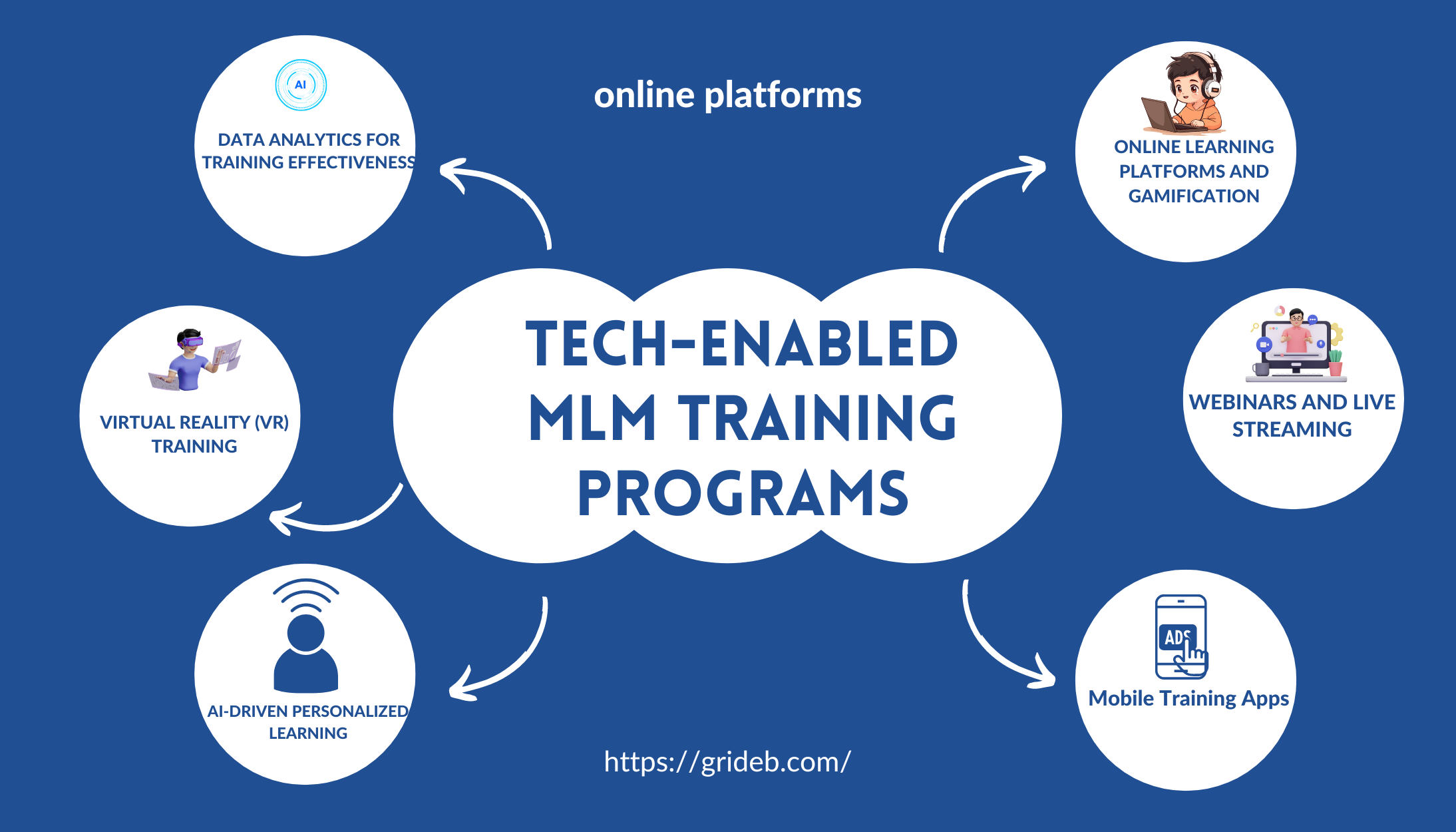Tech-Enabled MLM Training Programs refer to the integration of advanced technologies like Virtual Reality (VR), Augmented Reality (AR), Artificial Intelligence (AI), and online platforms to enhance the training and development of distributors within Multi-Level Marketing (MLM) companies. This approach modernizes traditional training methods, making them more interactive, accessible, and effective. Here's a deeper dive into what Tech-Enabled MLM Training Programs can offer in 2024:
1. Virtual Reality (VR) Training
Immersive Product Demonstrations:
VR allows distributors to experience products in a virtual environment, making it easier to understand and explain product features to potential customers.
Virtual Workshops and Simulations:
Distributors can participate in virtual workshops or simulations that mimic real-life scenarios, such as customer interactions or sales pitches, providing hands-on experience without the risk.
2. Augmented Reality (AR) for Product Visualization
Interactive Product Experience:
Distributors can use AR to show customers how a product would look or function in their own environment, enhancing the sales pitch. For example, AR could be used to visualize how a piece of furniture would look in a customer's home.
Training on-the-go: AR apps can overlay instructional content onto real-world products, guiding distributors through the features and benefits in real-time as they interact with the product.
3. AI-Driven Personalized Learning
Adaptive Learning Paths:
AI can analyze a distributor's progress and tailor the training content to their specific needs, ensuring they focus on areas where they need the most improvement.
Chatbots and Virtual Assistants:
AI-powered chatbots can provide instant answers to distributors' questions, offer tips during sales pitches, or suggest the next steps in their training program.
4. Online Learning Platforms and Gamification
Modular Training Courses:
Distributors can access online courses that they can complete at their own pace, covering various aspects of the MLM business, from product knowledge to marketing strategies.
Gamified Learning: Incorporating game-like elements, such as leaderboards, rewards, and challenges, can make the training process more engaging and motivate distributors to complete their training.
5. Webinars and Live Streaming
Global Reach:
Webinars allow MLM companies to train distributors from around the world simultaneously. Live Q&A sessions can make these webinars interactive and responsive to distributors' needs.
Recorded Sessions:
Distributors can access recorded training sessions at their convenience, allowing them to revisit key topics whenever needed.
6. Mobile Training Apps
Training on the Go:
Mobile apps provide easy access to training materials, videos, and updates, enabling distributors to learn at their convenience, whether they're at home or on the move.
Push Notifications for Updates: Apps can send reminders for upcoming training sessions or notify distributors of new content, ensuring they stay engaged and informed.
7. Data Analytics for Training Effectiveness
Performance Tracking:
Companies can use data analytics to track the progress of each distributor, identifying who is excelling and who may need additional support.
Feedback Loops: Regular analysis of training outcomes can provide insights into what’s working and what isn’t, allowing for continuous improvement of the training program.
8. Social Learning and Community Building
Peer-to-Peer Learning:
Online communities and forums within the training platform can encourage distributors to share tips, experiences, and best practices, fostering a sense of community and collective growth.
Mentorship Programs:
Tech platforms can pair new distributors with experienced mentors, facilitating one-on-one learning and support.
Benefits of Tech-Enabled MLM Training Programs
Increased Engagement: Interactive and immersive training methods keep distributors more engaged than traditional methods.
Scalability:
These programs can be easily scaled to accommodate growing numbers of distributors across different regions.
Flexibility: Distributors can access training materials anytime, anywhere, fitting into their schedules.
Improved Retention: The combination of gamification, personalized learning, and community support can lead to higher retention rates among distributors.
Challenges and Considerations
Cost of Implementation:
While effective, technologies like VR and AI can be expensive to implement, especially for smaller MLM companies.
Technology Adoption: Not all distributors may be tech-savvy, so companies need to ensure that the platforms are user-friendly and provide adequate support.
Content Quality: The effectiveness of tech-enabled training relies heavily on the quality of the content. Companies need to invest in high-quality, relevant, and up-to-date
training materials.
Tech-Enabled MLM Training Programs represent the future of distributor development, combining the latest technological advancements with proven training techniques to create a more effective, engaging, and scalable learning experience.
